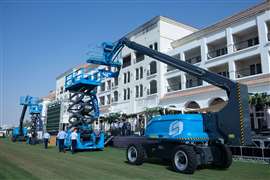Amazon adventure for Alimak
04 November 2013
.gif)
Two Alimak rack and pinion hoists were installed on transmission towers along the Amazon River, each as tall as the Eiffel tower in Paris, France.
The pair of Alimak Hek hoists were installed to provide vertical access to two tubular towers carrying three 500 kV and two 230 kV power cables across the Amazon River in Brazil. Located near the Equator, and with the nearest village of Almeirim an hour’s travel by speedboat, the environment would prove challenging.
At heights of 295 m, the transmission towers are the tallest of their kind in South America and the power line system stretches 1240 km through the Amazon rainforest.
The company was awarded the contract for supply and installation of the rack and pinion hoists by contractor Isolux Corsan. The pair have a maximum lifting height of 288.6 m and came into use at the site in March 2013. They allow service and maintenance personnel to access power cable stays and aircraft warning lights located on each tower.
The rack and pinion drive system offers advantages over wire rope and hydraulic elevators by carrying its own machinery and does not require an expensive machine room or load-bearing elevator shaft, explained the company.
In a power outage, the car uses gravity and a centrifugal brake system to slide back to the nearest landing at a controlled speed. Should the elevator car exceed the rated speed when descending, the car is stopped automatically by the Alimak safety device.






